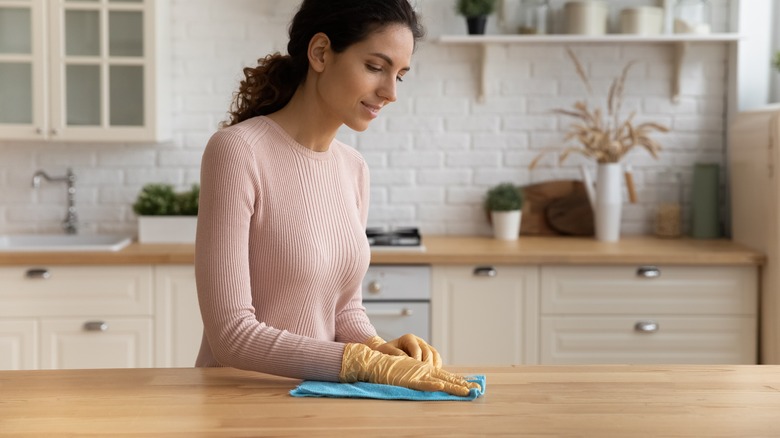Why You Should Think Twice Before Cleaning With Olive Oil
If you value natural, DIY, environmentally friendly, or budget home hacks, then you may have heard that olive oil can be used as a cleaning agent throughout your house. There are plenty of surprising ways to use olive oil in your home; people recommend it for polishing metals, helping to remove rust, caring for wood furniture, maintaining leather, and more. Olive oil takes off smudges and creates a barrier to keep metals shiny, hydrates wood, and conditions leather. Despite being commonly recommended as a versatile cleaning ingredient, there are downsides you should know about before you try it out. The primary reason to avoid using olive oil for cleaning is that it may become rancid, potentially causing problems like gross odors and even damage.
When olive oil is exposed to oxygen, light, or heat, it eventually becomes rancid. This process involves the breakdown of fat molecules, resulting in strange chemical smells. While olive oil can remain in good condition for years when it is left protected in its bottle, when you apply it to surfaces in your home for cleaning and leave it there, the oil left behind will expire and begin to show signs of rancidity on those surfaces. On your countertops, stainless steel appliances, and wood furniture, the olive oil will be exposed to light and oxygen, speeding up the process of oxidation and degradation, leaving you with unpleasant smells at best and irreversible damage at worst. Olive oil is a non-drying oil, and over-applying it to wood furniture can cause the wood to swell over time. On other surfaces, it will start to smell like old glue, crayon, or wet cardboard as it degrades.
Should you use olive oil for cleaning in your home?
When you try to clean with olive oil in the way that is often suggested – typically applying plain olive oil or a solution of olive oil and other ingredients using a rag– you will leave behind residue that will oxidize and turn rancid. Some instructions involve the step of wiping away excess olive oil using a damp and absorbent cloth, but on porous substances, the olive oil will seep in and not be able to be removed in this way. Excess olive oil can be tricky to remove, though, and can even cause stains on some materials.
It is worth mentioning that some people report that mixing the olive oil with vinegar prevents rancid smells from occurring, even when olive oil is applied to porous surfaces like wood. Vinegar is reported to absorb odors and neutralize them naturally, which could explain the lack of smell over time when they are combined. If you want to know more about using vinegar, you can learn how vinegar can be a versatile cleaning tool.
Overall, you should probably avoid using olive oil to clean your home. If you decide to try cleaning with olive oil, it is best to only do so on non-porous surfaces to avoid potential damage and unpleasant odors over time. A kitchen sink might be a better option than butcher block countertops, but be sure to know the truth about using olive oil to clean your kitchen sink before giving it a try.

